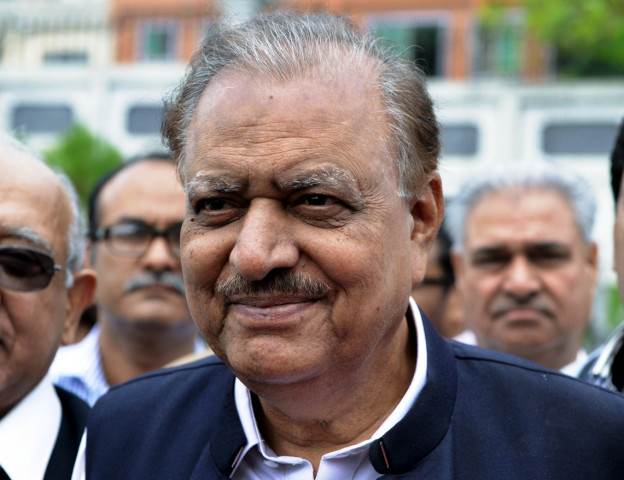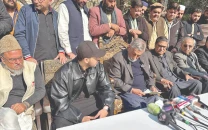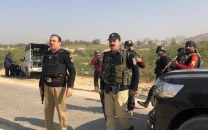Anti-terror: President approves Pakistan Protection Ordinance
All peace-disrupting elements will be considered 'enemies of the state' and dealt with accordingly.

President Mamnoon Hussain signed the Pakistan Protection Ordinance today. PHOTO: AFP/FILE
The President stamped his approval following advice from the Prime Minister. This is a separate ordinance which promises to bring in new legislation to improve the country's precarious security situation and strengthen the Anti-Terrorism (Amendment) Ordinance 2013.
According to the new Ordinance, "Security of life, property and dignified living of our own people shall be the prime goal for all functionaries of the state."
“Writ of the state shall be restored with full might of the law; those to pursue fruit of terror and fear, regardless of nationality, color, creed or religion shall be treated as enemy aliens and dealt with strictly without any compunction”, the ordinance stated.
The government pledged itself to increasing security of life in the country and to summon every possible resource and tactic to serve the state's mission of reviving peace in the country.
The Ordinance included the following clauses:
1. Every possible state instrument and resource will be deployed to defeat and frustrate all or any nefarious attempt to create disorder.
2.The cancer of syndicated crime, in all its forms and manifestations, shall be responded by proportionate use of state force under the law.
3. Separate police stations will be designated for professional and expeditious investigations of specified crime, prosecuted through federal Prosecutors.
4. Special Federal Courts shall be designated to render inexpensive justice with promptitude as mandated by Article 37.
5. Joint investigation teams shall be constituted to conduct investigations by security agencies and police in all heinous crimes committed in areas where civil armed forces are invited to aid civil power.
6. Those involved in syndicated crime shall be relocated to other parts of the country for transparency and fair trial.
7. Judicious and effective use of preventive detentions shall be made in cases involving serious crimes by criminal gangs and mafias.
8. Special jails shall be designated to detain hardened criminals and the minimum quantum of punishments is now re-determined at ten years.
9. The state will not allow Afghan immigrants or other foreign nationals to be used for terrorist purposes.
Anti-terrorism legislation piling up
Sunday's ordinance is just another addition to a list of anti-terrorism legislation the Pakistan Muslim League-Nawaz (PML-N) government has been introducing in the recent past.
Earlier this month, the President had promulgated another ordinance, which proposed longer detention for suspects and accepted electronic evidences and trials by video links.
The amendments also introduced new witness protection measures and instructed provincial governments “to take necessary steps to ensure that prisoners in jails do not have access to mobile phones.”
Full text of the ordinance is produced below:
Ordinance
further to amend the Anti-terrorism Act, 1997
WHEREAS it is expedient further to amend the Anti-terrorism Act, 1997 (XXVII of 1997), for the purposes hereinafter appearing;
AND WHEREAS the National Assembly and the Senate are not in session and the President is satisfied that circumstances exist which render it necessary to take immediate action;
NOW, THEREFORE, in exercise of the powers conferred by clause (1) of Article 89 of the Constitution of the Islamic Republic of Pakistan, the President is pleased to make and promulgate the following Ordinance:-
1. Short title and commencement.-
(1) This Ordinance may be called the Anti-terrorism (Amendment) Ordinance, 2013.
(2) It shall come into force at once.
2. Amendment of section 5, Act XXVII of 1997.- In the Anti-terrorism Act, 1997 (XXVII of 1997), hereinafter referred to as the said Act, in section 5, in sub-section (2), in paragraph (i), for the words “when fired upon” the words and comma “after forming reasonable apprehension that death, grievous hurt or destruction of property may be caused by such act” shall be substituted;
3. Amendment of section 11EEEE, Act XXVII of 1997.– In the said Act, in section 11EEEE,-
(i) for sub-section (1), the following shall be substituted, namely,-
“(1) The Government or, where the provisions of section 4 have been invoked, the armed forces or civil armed forces, as the case may be, subject to the specific or general order of the Government in this regard, for period not exceeding three months and after recording reasons thereof, issue order for the preventive detention of any person who has been concerned in any offence under this Act relating to the security or defence of Pakistan or any part thereof, or public order relating to target killing, kidnapping for ransom, and extortion / bhatta, or the maintenance of supplies or services, or against whom a reasonable complaint has been made or credible information has been received, or a reasonable suspicion exists of his having been so concerned, for purpose of inquiry:
Provided that further detention of such person if necessary shall be subject to provisions of Article 10 of the Constitution.”;
(ii) in sub-section (2), for the full stop at the end a colon shall be substituted and thereafter the following proviso shall be inserted, namely:-
“Provided that where the detention order has been issued by the armed forces or civil armed forces under sub-section (1), the inquiry shall be conducted by the JIT comprising members of armed forces or civil armed forces, as the case may be, intelligence agencies and other law enforcement agencies, including a police officer not below the rank of Superintendent of Police; and
(iii) after sub-section (2) amended as aforesaid, the following new sub-section shall be inserted, namely:-
“(2a) The provisions of sub-sections (1) and (2) amended as aforesaid shall remain in force for such period as may be notified by the Government from time to time:
Provided that such period shall not exceed two years from the commencement of the enactment of this Ordinance by Parliament.”.
4. Amendment of section 18, Act XXVII of 1997.- In the said Act, in section 18, in sub-section (1), the word “Provincial” shall be omitted.
5. Amendment of section 19, Act XXVII of 1997.- In the said Act, in section 19,- (i) for sub-section (1), the following shall be substituted, namely:-
“(1) The offences under this Act shall be investigated by a police officer not below the rank of Inspector or, where the Government deems it necessary, by a Joint Investigation Team (JIT) to be constituted by the Government comprising the investigating officer of police not below the rank of Inspector, and officers from intelligence agencies and other law enforcement agencies. The investigating officer or the JIT, as the case may be, shall complete the investigation in respect of cases triable by the Court within thirty working days. The report under section 173 of the Code shall be signed and forwarded by the investigating officer of police directly to the Court:
Provided that where the provisions of sections 4 and 5 have been invoked, the investigation shall be conducted by the JIT comprising members of armed forces or civil armed forces, as the case may be, intelligence agencies and other law enforcement agencies including an investigating officer of police not below the rank of Inspector who shall sign the report under section 173 of the Code and forward it to the Court.
Provided further that, where investigation is not completed within a period of thirty days from the date of recording of the first information report under section 154 of the Code, the investigating officer or the JIT shall, within three days after expiration of such period, forward to the Court through the Public Prosecutor, an interim report under section 173 of the Code, stating therein the result of investigation made until then and the Court shall commence the trial on the basis of such interim report, unless, for reasons to be recorded, the Court decides that the trial may not so commence. The interim report shall be signed by the investigating officer of police.”;
(ii) after sub-section (1A), the following new sub-section shall be inserted, namely:-
“(1B) Where any person has been arrested by the armed forces or civil armed forces under section 5, he shall be handed over to the investigating officer of the police station designated for the purpose by the Provincial Government in each District.”;
(iii) for sub-section (7), the following shall be substituted, namely:-
“(7) The Court shall, on taking cognizance of a case, proceed with the trial from day-to-day and shall decide the case within seven days, failing which the matter shall be brought to the notice of the Chief Justice of the High Court concerned for appropriate directions, keeping in view the facts and circumstances of the case.”;
(iv) in sub-section (8), for the words “consecutive adjournments during the trial of the case” the words “adjournments during the trial of the case and that too on imposition of exemplary costs” shall be substituted; and
(v) in sub-section (8a), after the word “sub-section” the brackets, figure and word “ (7) or” shall be inserted.
6. Insertion of new section, Act XXVII of 1997.- In the said Act, after section 19A, the following new section shall be inserted, namely:-
“19B Pre-trial scrutiny.- Before commencement of the trial, the Prosecutor shall scrutinize the case file to ensure that all pre-trial formalities have been completed so that the actual trial proceeds uninterrupted from day-to-day.”.
7. Amendment of section 21, Act XXVII of 1997.- In the said Act, in section 21,-
(1) in sub-section (2), after the word “proceedings” and full-stop at the end, the following shall be inserted, namely:-
“These measures may include the following, namely:-
(a) screens may be used during trial to shield witnesses, Judges and Prosecutors from public view;
(b) trial may be held in jail premises or through video link
(c) witness protection programmes may be established by the Government through law or rules.
The Provincial Government shall take necessary steps to ensure that prisoners in jails do not have access to mobile phones.”; and
(2) after sub-section (3), the following new sub-section shall be inserted, namely:-
“(4) The provisions of this section shall have effect notwithstanding anything contained in any other law for the time being in force, including the Qanun-e-Shahadat, 1984 (P.O. No. 10 of 1984).”.
8. Amendment of section 27, Act XXVII of 1997.- (1) Section 27 shall be renumbered as sub-section (1) thereof, and,-
(i) in the short title, after the word “investigation” the words “and reward for successful investigation” shall be added; and
(ii) after sub-section (1) renumbered as aforesaid, the following new sub- section shall be inserted, namely,-
“(2) Incentive systems shall be introduced by the Provincial Governments providing for appropriate rewards to investigating officers who conduct successful investigation.”.
9. Insertion of new section, Act XXVII of 1997.- In the said Act, after section 27A, the following new secers who conduct successful investigation.”.
9. Insertion of new section, Act XXVII of 1997.- In the said Act, after section 27A, the following new section shall be inserted, namely:-
“27B. Conviction solely on the basis of electronic or forensic evidence etc.- Notwithstanding anything contained in this Act or Qanun-e-Shahadat, 1984 (P.O.No.10 of 1984) or any other law for the time being in force, the conviction of an accused for an offence under this Act solely on the basis of electronic or forensic evidence or such other evidence that may have become available because of modern devices or techniques referred to in Article 164 of the Qanun-e-Shahdat, 1984 (P.O. No. 10 of 1984), shall be lawful.”.
10. Amendment of section 28, Act XXVII of 1997.- In the said Act, in section 28,-(i) after sub-section (1), the following new sub-section shall be inserted, namely:-
“(1A) Where it appears to the Government that it would be in the interest of justice or expedient for protection and safety of judges, witnesses or prosecutors, it may apply to the Chief Justice of the High Court concerned for transfer of a case from an Anti-terrorism Court falling within its jurisdiction to an Anti-terrorism Court in any other place in Pakistan, and for this purpose shall also seek concurrence of the Chief Justice of the High Court concerned.”; and
(ii) after sub-section (2), the following new sub-sections shall be added, namely:-
“(3) The Federal Government may in the interests of justice and for protection and safety of witnesses and investigators, transfer the investigation of any case from one place to any other place in Pakistan.
(4) The investigating officer or the agency to which case is transferred under sub-section (3), may proceed from the stage the inquiry or investigation was left or may proceed with the case as if it had been originally entrusted to him or the agency, as the case may be.
(5) On completion of investigation and before submission of report under section 173 of the Code, the Federal Government may direct that the case falling in the jurisdiction of a particular Anti-terrorism court may be forwarded for trial to another Anti-terrorism court any where in Pakistan, as may be specified by the Federal Government in this behalf, in the public interest or for the safety and protection of judges, public prosecutors or witnesses.”



















COMMENTS
Comments are moderated and generally will be posted if they are on-topic and not abusive.
For more information, please see our Comments FAQ